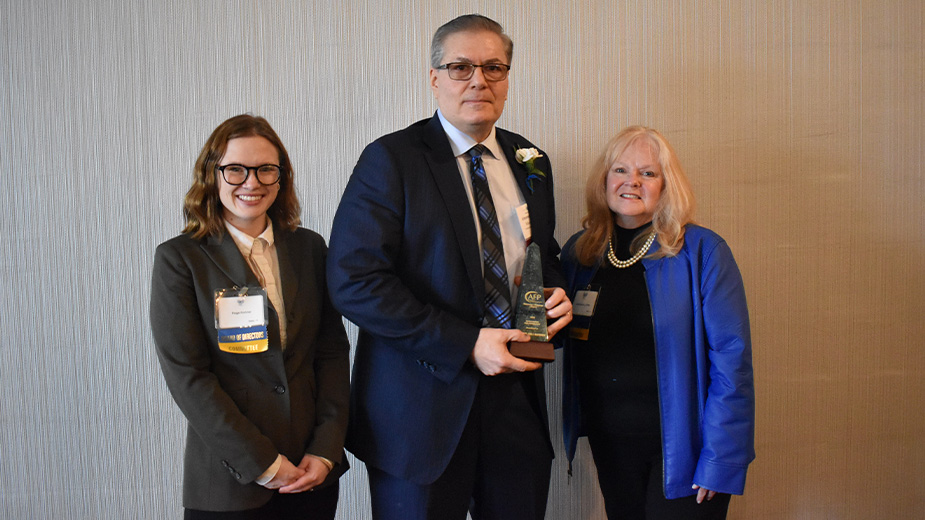Stein Shares Stories of a Long, Varied (Mostly Fun) Career
YOUNGSTOWN, Ohio – Commentator, columnist, author, lawyer, actor, screenwriter, economist, teacher, television personality, not to mention a stint in the Nixon White House as a speechwriter during the early 1970s.
Ben Stein says he’s had one heck of a fortunate life. And, with the exception of being a lawyer and economist, Stein said it’s all been fun.
“I always wanted to be a writer,” Stein told students from Youngstown State University during an afternoon question and answer session Thursday at Stambaugh Auditorium. “I was a big reader of mystery stories.”
He said he was most impressed with Agatha Christie’s books and envisioned spending his life at a beach house penning whodunits.
Then again, being the president of General Motors sounded like a good job, too. “So, I wanted to be a writer and a captain of industry – the captain of industry part didn’t quite work out.”
Stein, now 73, was the featured speaker at this year’s YSU Skeggs Lecture series. After meeting with students, the conservative media personality presented an hour-long talk at Stambaugh Auditorium Thursday evening before a packed house.
Meeting with reporters before his lecture, Stein tackled topical issues such as his assessment of the Trump Administration and the media, while also taking time to address the course of his career.
“The Trump Administration – considering the fact that it’s under constant daily attack by the media – I think it’s doing fairly well,” Stein said.
He noted the media attacks intensified when Trump was elected and the president has simply fought back. Stein also weighed in on Trump’s pick to for the Supreme Court, Brett Kavanaugh, and questioned recent allegations by Christine Blasey Ford that the nominee attacked her at a party while they were in high school. “If its an uncorroborated, unsubstantiated event that happened 36 years ago and she never reported it at all, I’m not sure how seriously to take it, frankly,” he said. “If there was some corroboration, then I would say absolutely it’s outrageous.”
That said, Stein added that he’s puzzled over Trump’s policies such as the tariffs and the tax cuts, especially when the national debt keeps climbing. “In terms of his economic policy, I don’t think he’s done anything great. I don’t understand why the economy is booming as it is, other than the fact that it is a deficit-fed boom,” he said
Despite being a conservative, Stein also said he supports some form of universal health care backed by the government. “I feel that’s immoral that people who aren’t well to do can’t get health care,” he said.
Yet, political commentary is just one aspect of Stein’s diverse career, one that’s taken him from Columbia University to the White House to Hollywood.
“He is a profoundly unique individual,” said YSU President Jim Tressel in his introduction. “One of those who can safely says ‘been there, done that.’ ”
Stein put it a little differently. “It was largely luck,” he said of his storied career, which he shared with the audience during his talk.
Growing up in the Maryland suburbs of Washington, D.C., during the 1940s and 1950s, he saw firsthand the effects of institutional racism against African Americans, while at the same time experiencing the prevalent anti-Semitism that permeated Washington society.
“Prejudice was the law in D.C.,” Stein recalled. “Blacks had it the worst. It made me physically sick.” However, it instilled in Stein a lifelong quest to address such inequities.
Stein went on to study at Columbia University and then enrolled in Yale Law School upon graduation.
“I didn’t dislike it – I hated it. I absolutely hated it,” he told the audience to laughter. After his first year, he dropped out, and went back to Washington to work as an economist at the U.S. Department of Commerce.
“It was incredibly boring,” he said. “It was like being asleep all day long.”
Realizing the daily work of an economist was not for him, Stein returned to Yale Law and this time found it more appealing. There, he earned a reputation as a student radical, protesting against the Vietnam War (he received a deferment because of a health issue) and even donating to a free breakfast program for poor children run by the Black Panther Party of New Haven.
He also earned a reputation for standing up to abusive professors and on one occasion threatened to strip naked in class if the professor didn’t ease off on the students. When the professor became angry, Stein started to disrobe and won the hearts and minds of his classmates. He credits this incident as one of the reasons students elected him valedictorian of the class.
“When I gave my graduation speech, my mother went up to the dean and said ‘Pay no attention to him. He’s been a troublemaker all his life,’ ” he recalled.
At the time, Stein described himself as a “student radical folk hero.
“I was a hippie. I had long hair and a mustache – who was going to hire me?” he asked.
He found a job as a litigator at the Federal Trade Commission, which he found “tense, angry, hopeless.” So, he left that job to become a teacher at American University, where he developed a class on political film and culture. “I started a whole new school of mass cultural studies,” which grew to 300 students in three semesters. “I loved them and I was addicted to speaking in front of people.”
Stein eventually returned to his job at the Federal Trade Commission and found he hated it even more, by now calling himself a “Republican hippie.” Meantime, he started to write columns that were sympathetic to the Nixon administration and Watergate, which caught the eye of Nixon’s team.
Stein’s father was a member of Nixon’s Council of Economic Advisors, and he thought the president had treated his family very well. “I was offered a job as a speechwriter in the White House,” he said. “I loved Nixon. I didn’t think he did anything seriously wrong.”
But it was an opportunity to cover arts and entertainment for the Wall Street Journal that launched Stein into his next career as a screenwriter and actor in Hollywood.
Through his contacts in the entertainment world, Stein was able to land a job writing for producer Norman Lear’s production company – especially the shows “Mary Hartman, Mary Hartman,” and “Fernwood 2Night.”
Lear especially liked Stein, noting that he was the “only funny conservative I ever met.” Stein then made more connections throughout Hollywood.
Eventually, one producer noticed that Stein’s charisma and humor suited him onscreen better than off it, and was offered a small part as an economics teacher in a movie about an impish high school senior planning a day of truancy.
“Let me put you in a movie called ‘Ferris Bueller’s Day Off,’ ” Stein recalls the producer telling him. “He put me in front of the camera and said ‘Just improvise.’ ”
The result was a performance that is among the most iconic in any comedic movie of the 1980s. “And it all started basically with Richard Nixon.”
Pictured: Ben Stein addresses YSU students before his Skeggs Lecture Sept. 20.
Copyright 2024 The Business Journal, Youngstown, Ohio.



